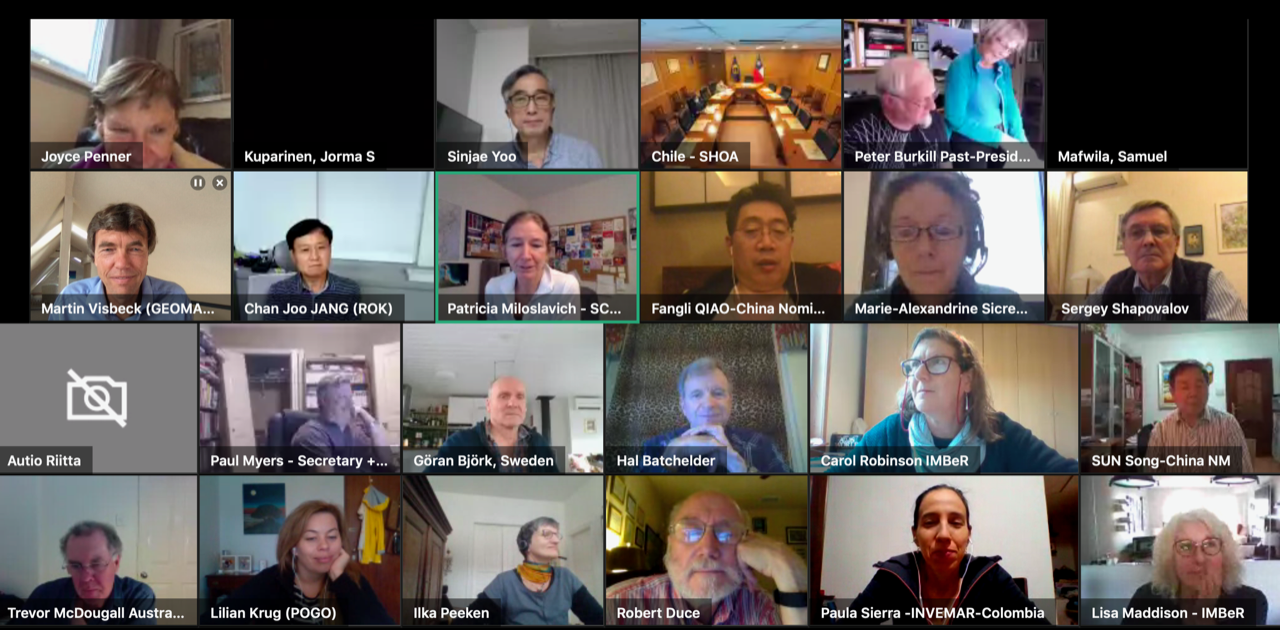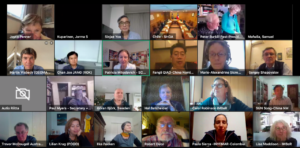Due to the COVID19 situation, the meeting was held virtually
Materials for Meeting
Logistical Information
- GoToMeeting – virtual platform
Events (7-10 am EDT / 11 am – 2 pm UTC)
- 20th October 2020. Session 1: Opening, results of elections of new SCOR officers, approval of revised SCOR Constitution, and discussion of new WG proposals
- 21st October 2020. Session 2: Reports/updates from current SCOR Working Groups and projects
- 22nd October 2020. Session 3: Reports/updates from affiliated organizations and capacity development activities, closing of meeting
Call for Review of WG Proposals
Ten SCOR working group proposals were submitted for consideration for the 2020 SCOR Call for proposals. The proposals are available in the links below in Tab 2.1.
Instructions for reviewing the proposals is available here. We welcome reviews from national SCOR committees, partner organizations, and individuals.
Background Information and content for Meeting
Table of contents
Tab 0. Agenda and Participants List
0.1. Agenda
0.2. Participants
DAY 1: 20 October 2020 (Synthesis slides Day 1)
SCOR Executive Committee and National Committee nominated members only
Tab 1 – Opening topics
1.1. In Memoriam – Obituary for scientists involved with SCOR
1.2. Report of the SCOR President
1.3. Report of SCOR Executive Director [Narrated presentation]
1.4. Appointment of ad hoc Finance Committee: the 2020 SCOR Finance Committee is composed by Isabel Ansorge (South Africa), Peter Croot (Ireland), Daniel Weihs (Israel) and Sun Song (China) – committee appointed by the SCOR Executive on the 14th of September 2020.
1.5. 2020 SCOR Elections for SCOR Officers
1.6. Revised SCOR Constitution (Memo to nominated and affiliated members, current Constitution, proposed changes)
1.7. 2020 selection of Early Career Scientist representative to the SCOR Executive Committee (call for applications) (selected candidate)
Tab 2 – Working Groups
Tab 2.1. New Working Group proposals
2.1.1. Analysing ocean turbulence observations to quantify mixing (ATOMIX)
2.1.2. TRACE element SAMplers and sensORS (TRACESAMORS)
2.1.3. Benthic Foraminifera as Ecological Sentinels of Marine Systems Health (FORAM-ECO)
2.1.4. Elucidating THreats tO Sandy beaches: a global synthesis (ETHOS)
2.1.5. Integration of international ocean acidification research at CO2 seeps (InterSEEP)
2.1.6. Mapping climate change refugia for marine conservation (MarCCR)
2.1.9. Developing an Observing Air-Sea Interactions Strategy (OASIS)
DAY 2: 21 October 2020 (Synthesis slides Day 2)
Open to all registrants
Tab 2.2. Working Groups Reports
2.2.1. WG#143. Dissolved N2O and CH4 measurements: Working towards a global network of ocean time series measurements of N2O and CH4 [Narrated presentation]
2.2.2. WG#145. Modelling Chemical Speciation in Seawater to Meet 21st Century Needs (MARCHEMSPEC) [Narrated presentation]
2.2.3. WG#148. International Quality Controlled Ocean Database: Subsurface temperature profiles (IQuOD) [Presentation]
2.2.4. WG#150. Translation of Optical Measurements into particle Content, Aggregation & Transfer (TOMCAT)
2.2.5. WG#151. Iron Model Intercomparison Project (FeMIP)
2.2.6. WG#152. Measuring Essential Climate Variables in Sea Ice (ECV-Ice) [Narrated presentation]
2.2.7. WG#153. Floating Litter and its Oceanic TranSport Analysis and Modelling (FLOTSAM)
2.2.8. WG#154. Integration of Plankton-Observing Sensor Systems to Existing Global Sampling Programs (P-OBS) [Narrated presentation]
2.2.9. WG#155. Eastern boundary upwelling systems (EBUS): diversity, coupled dynamics and sensitivity to climate change [narrated presentation – audio only]
2.2.10. WG#156. Active Chlorophyll fluorescence for autonomous measurements of global marine primary productivity [Narrated presentation]
2.2.11. WG#157. Toward a new global view of marine zooplankton biodiversity based on DNA metabarcoding and reference DNA sequence databases (MetaZooGene) [Narrated presentation]
2.2.12. WG#158. Coordinated Global Research Assessment of Seagrass System (C-GRASS) [Narrated presentation]
2.2.13. WG#159. Roadmap for a Standardised Global Approach to Deep-Sea Biology for the Decade of Ocean Science for Sustainable Development (DeepSeaDecade)
Tab 3 – Large-Scale Ocean Research Projects reports
3.1. GEOTRACES – Marine Biogeochemical Cycles of Trace Elements and Isotopes [Narration and slides]
3.2. SOLAS – Surface Ocean – Lower Atmosphere Study [Narrated presentation] [Presentation slides]
3.3. IMBeR – Integrated Marine Biosphere Research [Narrated presentation]
3.4. IQOE – International Quiet Ocean Experiment [Narrated presentation]
3.5. IIOE-2 – International Indian Ocean Expedition 2 [Narrated presentation]
Tab 4 – Infrastructural Projects reports
4.1. COBS – Changing Ocean Biological Systems [Narrated presentation]
4.2. GlobalHAB – Global Harmful Algal Blooms [Narrated presentation]
4.3. IOCCP – International Ocean Carbon Coordination Project [Narrated presentation]
4.4. SOOS – Southern Ocean Observing System [Narrated presentation]
4.5. JCS – Joint Committee on Seawater (IAPWS/SCOR/IAPSO) [Narrated presentation]
DAY 3: 22 October 2020 (Synthesis slides Day 3)
Open to all registrants
Tab 5 – Affiliated projects and Non-governmental Organizations
Affiliated projects reports
5.1. IOCCG – International Ocean Colour Co-ordinating Group [Narrated presentation]
5.2. InterRidge – International RIDGE Studies
5.3. GACS – Global Alliance of Continuous Plankton Recorders
Affiliated organizations reports
5.4. IABO – International Association for Biological Oceanography [Narrated presentation]
5.5. IAPSO – International Association for the Physical Sciences of the Oceans
5.6. IAMAS – International Association of Meteorology and Atmospheric Sciences [Narrated presentation]
Tab 6 – Intergovernmental and partner Organizations
Intergovernmental organizations reports
6.1. IOC – Intergovernmental Oceanographic Commission
6.2. PICES – North Pacific Marine Science Organization
6.3. GESAMP – Joint Group of Experts on the Scientific Aspects of Marine Environmental Protection
Partner organizations reports
6.4. POGO – Partnership for Observation of the Global Oceans (added on the 10th of July 2020) [Narrated presentation]
6.5. ISC – International Science Council [Presentation]
6.6. SCAR – Scientific Committee on Antarctic Research
6.7. Future Earth – Ocean [Narrated presentation]
6.8. WCRP – World Climate Research Programme
Tab 7 – Capacity-Building Activities report
Compiled capacity building activities (SCOR Visiting Scholars, POGO-SCOR Visiting Fellowships, NSF travel support for developing countries, and others)
Tab 8 – SCOR Organization and Finance
Tab 9 – SCOR-Related Meetings

